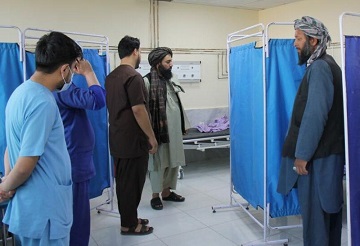Outbreak News: Crimean Congo Hemorrhagic Fever Outbreak In Iran Escalating From 60 Infected And 3 Dead As Of 27th Of August To Almost A Hundred Now!
Nikhil Prasad Fact checked by:Thailand Medical News Team Sep 02, 2023 1 year, 7 months, 2 weeks, 4 days, 7 hours, 21 minutes ago
Outbreak News: The world is witnessing a concerning escalation of the Crimean-Congo hemorrhagic fever (CCHF) outbreak in Iran. What initially started as a localized health concern has rapidly grown into a serious public health crisis. On August 27th, Iran reported 60 confirmed cases of CCHF with three tragic fatalities.
https://ifpnews.com/iran-60-crimean-congo-fever-3-killed/

However, the situation has since worsened, with the number of infected individuals now rising to almost a hundred. There is an urgent need for measures to be undertaken to combat its spread and for the international community to intervene before the disease spreads across its borders.
Understanding Crimean-Congo Hemorrhagic Fever
Crimean-Congo hemorrhagic fever is a viral disease transmitted primarily by ticks. The virus responsible for CCHF belongs to the Bunyaviridae family and is characterized by severe viral hemorrhagic fever outbreaks, with a case fatality rate that can range from 10% to 40%. The disease is particularly notorious for its rapid transmission and devastating consequences.
In the case of CCHF, animals become infected when bitten by ticks carrying the virus, and the virus remains in their bloodstream for about a week. This creates a cycle where other ticks can become infected when they feed on these animals.
While various tick genera can harbor the CCHF virus, ticks from the Hyalomma genus are the primary vectors.
Humans can contract CCHF through tick bites or by coming into contact with infected animal blood or tissues during and immediately after slaughter. This makes individuals involved in the livestock industry, such as agricultural workers, slaughterhouse employees, and veterinarians, particularly vulnerable to the disease. Furthermore, there is a risk of human-to-human transmission, further complicating containment efforts.
Escalation of the Outbreak in Iran
As of the latest reports and local
Outbreak News coverages, Iran is still grappling with an alarming increase in CCHF cases. The initial figure of 60 infected individuals and three deaths, reported on August 27th, has risen significantly. The exact number of cases now stands at almost a hundred (96), indicating a rapid spread of the virus within the country. One new fatality has also been reported.
This escalating outbreak has prompted an immediate and coordinated response from Iranian authorities, healthcare professionals, and relevant agencies. The State Veterinary Organization has been at the forefront of efforts to manage the crisis, stressing the critical importance of strict compliance with health precautions.
Preventive Measures and Public Responsibility
To contain the spread of CCHF, it is imperative that individuals take proactive measures to protect themselves and their communities. Crimean-Congo fever is a highly contagious disease, and its prevention hinges on a combination of public responsibility and good hygiene practices.
First and foremost, pr
acticing good hygiene is crucial. Regular handwashing and maintaining personal cleanliness can significantly reduce the risk of contracting CCHF. Additionally, avoiding contact with infected animals or their bodily fluids is essential.
It is also essential for healthcare professionals and the general public to stay informed about the latest developments and guidance from health authorities. Staying up-to-date on preventive measures and adhering to them diligently is key to curbing the transmission of this dangerous virus.
International Context
It's important to recognize that CCHF is not limited to Iran. The virus is widespread in several countries, including those in Africa and Asia, the Balkans, the Middle East, and the southern parts of the European region of Russia. Given its potential for human-to-human transmission, CCHF is a global concern, and international collaboration is vital in monitoring and containing outbreaks.
Conclusion
The escalating Crimean-Congo hemorrhagic fever outbreak in Iran is a stark reminder of the persistent threat posed by infectious diseases. The virus's rapid spread and high case fatality rate demand immediate and comprehensive responses from both the government and the public.
Authorities in Iran are working tirelessly to control the outbreak, but the collective effort of the entire community is needed to overcome this crisis. Practicing good hygiene, avoiding contact with infected animals, and staying informed about preventive measures are critical steps that each individual can take to protect themselves and those around them.
Furthermore, international cooperation and information sharing are essential to monitor and contain outbreaks of CCHF and other infectious diseases. The world must unite to combat this global health threat, reinforcing the importance of preparedness and collaboration in the face of emerging infectious diseases. Only through collective action can we hope to mitigate the impact of such outbreaks and prevent future crises of this magnitude.
For the latest
Outbreak News, keep on logging to Thailand Medical News.
